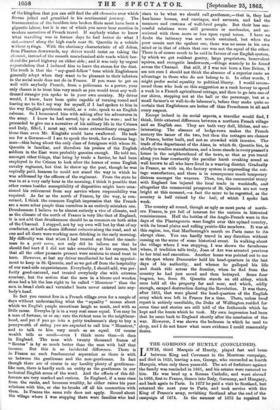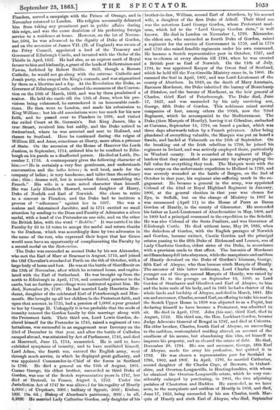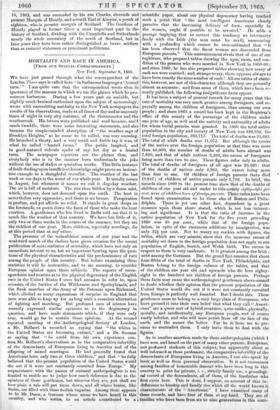THE GORDONS OF HUNTLY (CONCLUDED).
LEWIS, third Marquis of Huntly, played fast and loose- between King and Covenant in the Montrose campaign, and died in 1653, leaving a son, George, who succeeded as fourth Marquis, when only three years old. The act of forfeiture against the family was rescinded in 1661, and his estates were restored to him. He was bred up a Roman Catholic, and went abroad in 1668, first to France, thence into Italy, Germany, and Hungary, and back again to Paris. In 1672 he paid a visit to Scotland, but returned the next year to Paris, and took service with the King of France's army, revisiting Scotland after the end of the campaign of 1674. In the summer of 1675 he repaired to
Flanders, served a campaign with the Prince of Orange, and in November returned to London. His religion necessarily debarred
him from taki g any prominent part in public affairs during
this reign, and was the cause doubtless of his preferring foreign service to a residence at home. However, on the 1st of Novem-
ber, 1684, he was advanced to the dignity of Duke of Gordon, and on the accession of James VIE. (II. of England) was sworn of the Privy Council, appointed a lord of the Treasury and Governor of Edinburgh Castle, and invested with the Order of the Thistle in April, 1687. He had also, as an express mark of Royal favour to him and hisfamily, a grant of the lands of Mellerstaines and Fawns, forfeited by Robert Baillie. Still, though a Roman Catholic, he would not go along with the extreme Catholic and Jesuit party, who swayed the King's counsels, and was stigmatized by them as a libertine and a fop. At the Revolution the Duke, as Governor of Edinburgh Castle, refused the summons of the Conven- tion on the 16th of March, 1689, and was by them proclaimed a traitor. He held the castle till the 13th of June, when his pro- visions being exhausted; he surrendered it on honourable condi- tions. He then went to London, and made his submission to King William ; but his old associations were too much for his new faith, and he passed over to. Flanders in 1691, and visited the exiled Court at St- Germain's. But King James, like a true Stuart, received him but coldly, and the Duke retired to Switzerland, where he was arrested and sent to Holland, and thence to Scotland. Here he continued during the reigns of William HI. and Anne, sometimes at liberty, more often a prisoner of State. 04 the accession of the House of Hanover the Lords Justices, in September, 1714, ordered him to be confined to Edin- bttrgh on his parole as a disaffected person. He died at Leith, De- cember 7, 1716. A contemporary gives the following character of him:-" He is certainly a very fine gentleman, and understands conversation and the belles lettres; is well bred, made for the company of ladies ; is very handsome, and taller than the ordinary size ; thin ; dresses well, but is somewhat finical, resembling the French." His wife is a more noted character than himself. She was Lady Elirabeth Howard, second daughter of Henry, Duke of Norfolk and Earl of Norwich. She chose to retire to a convent in Flanders, and the, Duke had to institute a process of "adherence" against her in 1697. She was a zealous and determined Jacobite, and in 1711 excited no small attention by sending to the Dean and Faculty of Advocates a silver medal, with a head of the Pretender on one side, and on the other the British Islas, with the word " Reddite." It was carried in the Faculty by 63 to 12 votes to accept the medal and return thanks to the Duchess,. Which was accordingly done by two advocates in the name of the teat, who expressed their hopes that her Grace would soon have an opportunity of complimenting the Faculty by a second medal on the Restoration. '
The Duke was succeeded as second Duke by his son Alexander, who met the Earl of Marr at Braemar in August; 1715, and joined the Old Chevalier's standard at Perth on the 6th of October, with a large body of horse and foot. He was at the battle of Sheriffmuir on the 13th of November, after which he returned home, and capitu- lated with the Earl of Sutherland. He was brought up from the north to Edinburgh in April, 1716, and committed prisoher to the castle, but no further proceedings were instituted against him. He died, November 28, 1728, He had married Lady Henrietta Mor- daunt, daughter of the celebrated Earl of Peterborough and Mon- mouth. She brought up all her children in the Protestant faith, and Upon that account, in 1735, had a pension of 1,000/. ayear granted to her by George II. Unhappily it is too probable that the seeds of insanity entered the Gordou family by this marriage along with the Protestant faith. Their third son, Lord Lewis Gordon, de- clared himself for the Pretender in 1745, raised a regiment of two battalions, was successful in an engagement near Inverary on the 23rd of December in that year, and after the battle of Cullciden
escaped abroad, was attainted by Act of Parliament, 1746, and died smallness of his means, but abandoning this idea, set himself to at Montrueil, June 15, 1754, unmarried. He is said to have improve his property, and so cleared the estate of debt. He died, exhibited symptoms of insanity, and to have mutilated himself.
Lord Adam, the fourth son, entered the English army, went through much service, in which he displayed great gallantry, and was appointed Commander-in-Chief of the forces in Scotland in 1789. He died a general on the 13th of August, 1801.
Cosmo George, his eldest brother, succeeded as third Duke of Gordon, was one of the Scotch representative peers in 1747, but died at Breteuil, in France, August 5, 1752. Under the Jurisdiction Act of 1747 he was allowel for his regality of Huntly parishes of Chesterton and Haddon. He succexled, as we have 4,0001.; of Urquhart, 3001.; bailiary of Spynie; 5001.; Kinloss, seen, to the marquisate and earldom of Huntly in 1836, and died, 1821. 19s. 6d. ; Bishop of Aberdeen's patrimony, 3001.; in all, June 17, 1853, being succeeded by his son Charles, tenth Mar- 5,2821. He married Lady Catherine Gordon, only daughter of his quis of Huntly and sixth Earl of Aboyne, who died, September
brother-in-law, William, second Earl of Aberdeen, by his second wife, a daughter of the first Duke of Atholl. Their third son was the notorious Lord George Gordon, whose Protestant mad- ness, which led to the "Lord George Gordon riots," is well known. He died in London on November 1, 1793. Alexander, the eldest son, who succeeded as fourth Duke of Gordon, raised a regiment for the service of Government in 1759, and in 1778 and 1793 also raised fencible regiments under his own command. He became a Scotch representative peer in October, 1767, and was re-chosen at every election till 1784, when he was created a British peer as Earl of Norwich. On the 11th of July, 1794, be was appointed Keeper of the Great Seal of Scotland, which he held till the Fox-Greville Ministry came in, in 1806. hl4e resumed the Seal in April, 1807, and was Lord-Lieutenant of the county of Aberdeen. In 1819, on the death of Mary Anastasia, Baroness Mordaunt, the Duke inherited the barony of Beauchamp of Bletahoe, and the barony of Mordaunt, as the heir general of Charles, third Earl of Peterborough: The Duke died, June 17, 11827, and was succeeded by his only surviving son, George, fifth Duke of Gordon. This nobleman raised several companies of foot, among others. the '100th, now the 92nd Regiment, which , he accompanied to the Mediterranean. The Duke (then Marquis of Huntly), leaving it at Gibraltar, embarked at Comma, September .14, 1794, 'on board a packet, which was three days afterwards taken by a French privateer. After being plundered of everything valuable, the Marquis was put on board a Swede, and landed at Falmouth on the 24th of Septethber. Oii the breaking out of the Irish rebellion in 1798, he joined his regiment in Ireland, and was actively employed there, particularly in Wexford county. It is recorded of his regiment of High- landers that they astonished the peasantry by always paying the full value for everything they took. The Marquis went with the same corps on the unfortunateexpedition to Holland in 1799, and was severely wounded at the battle of Bergen, on the 2nd of October in that year, his regiment also sufferink much in the en- gagement. He became a general in the army, was appointed Colonel of the 42nd or Royal Highland Regiment in January, 1806, at the general election in that year was chosen for Eye, in Suffolk, but on the change of Ministry in 1807 he was summoned (April 11) to the House of Peers as Baron Gordon of Huntly, in the county of Gloucester. He succeeded his father as Lord-Lieutenant of Aberdeenshire in May, 1808, and in 1809 had a principal command in the expedition to the Scheldt. He was also Colonel of the Scots Fusiliers, and was Governor of Edinburgh Castle. He died without issue, May 28, 1836, when the dukedom of Gordon, with the English peerage.s of Norwich and Gordon, became -extinct, Castle Gordon and the principal estates passing to the fifth Duke of Richmond and Lennox, son of Lady Charlotte Gordon, eldest sister of the Duke, in accordance with a provision made to that effect. The baronies of Mordaunt andBeauchamp fell into abeyance, while the marquisate and earldom of Huutly devolved on the Duke tof 49ordon's kinsman, George; fifth Earl of Aboyne, who thus became ninth Marquis of Huntly. The ancestor of this latter nobleman, Lord Charles Gordon, a younger son of George, second Marquis of IIuntly, was raised by Charles II. to the peerage on September 10, 1660, as Lord Gordon of Strathaver and Glenlivet and Earl of Aboyne, to him and the heirs male of his body, and in 1661 he had a charter of the whole lands and lordship of Aboyne, and died in March, 1681. MEI son and successor, Charles, second Earl, on offering to take his seat in the Scotch Upper House in 1698 was objected to as a Papist, but declaring himself to have become a Protestant, was admitted to sit. He died in April, 1702. John (his son), third Earl, died in August, 1732. His third son, the Hon. Lockhart Gordon, became Judge Advocate General of Bengal in 1787, and died at Calcutta. His elder brother, Charles, fourth Earl of Aboyne, on succeeding to the earldom, contemplated residing abrovl, on account of the December 28, 1794. His son and successor, George, fifth Ear1 of Aboyne, made the army his profession, but quitted. it in 1792. He was chosen a representative peer for Scotland in 1796, 1802, and 1807. In April, 1791, he married Catherine,' second daughter of Sir Charles Cope, of Brewern, in Oxford- shire, and Overton-Longneville, in Huutingdonshire, with whom: he obtained the Overton-Longueville estate, which he very con- siderably enlarged by purchasing, in 1803, the two adjoining
18, 1863, and was succeeded by his son Charles, eleventh and present Marquis of Huntly, and seventh Earl of Aboyne, a youth of eighteen, who is premier marquis of Scotland. The Gordons of Huntly played in former times a most important part in the history of Scotland, dividing with the Campbells and Satherlands nearly the whole suzerainty of the north of Scotland, but in later years they have been rather distinguished as brave soldiers than as eminent statesmen or prominent politicians.
































 Previous page
Previous page